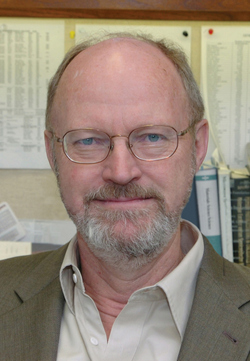Robert H Grubbs


Professor Robert H Grubbs, Nobel Laureate in Chemistry
Doctor of Science, honoris causa (2015)
Professor Robert Grubbs is an organic chemist whose work on catalysts has been widely applied in medicine and industry, and has paved the way for the development of green chemistry. Born in rural Kentucky in 1942, in a house that his father had built, both of his parents were from small farm families. His mother and grandmother provided great role models of the value of education, and although his father did not attend college, he was a very gifted mechanic and a practical engineer. The academic model of his mother and grandmother, and the practical mechanical training from his father, turned out to be Professor Grubbs’ foundation for organic chemical research. As a child, Professor Grubbs was always interested in building things. Instead of buying candy, he would buy nails to construct things out of wood. His mother claimed that this is why he was such a skinny child.
Because he had grown up in a rural setting and spent many hours working on farms, it was natural that Professor Grubbs started his university studies at the University of Florida as an Agricultural Chemistry major. It was there that he discovered the joy of making new molecules through the mentorship of Professor Merle Battiste. After completing his studies at the University of Florida, Professor Grubbs obtained his PhD from Columbia University in 1968. He then worked as a postdoctoral fellow at Stanford University, before joining the faculty of Michigan State University where he rose to the rank of Associate Professor. After Michigan State University, Professor Grubbs joined the California Institute of Technology (Caltech) where he is currently the Victor and Elizabeth Atkins Professor of Chemistry, a position he has held since 1990.
Over the past decades, Professor Grubbs and his research teams have worked on the development of powerful new catalysts for metathesis. In recent years, the major focus of the research group has been on the olefin metathesis reactions. To optimise the utility of this reaction, new catalysts, which are named Grubbs’ catalysts after Professor Grubbs, have been developed. In addition to their broad usage in academic research, these catalysts have also led to the advancement in industrial and pharmaceutical methods which have become simpler, more efficient and environment-friendly. This marks a great step forward for “green chemistry” and the possibility of reducing potential hazardous waste through smarter production methods. Professor Grubbs’ efforts demonstrate how science can be applied for the benefits of mankind, society and the environment. According to Professor Grubbs, it is very pleasing that a process that he started to study with pure intellectual curiosity has resulted in new processes with very practical applications.
A scientist with perseverance and dedication, Professor Grubbs has exerted a positive and lasting influence on innumerable faculty members and students throughout his academic career which spans nearly five decades. Boasting over 600 publications and 135 patents based on his research, Professor Grubbs has been bestowed with numerous awards and prizes. Among his long list of honours, Professor Grubbs, along with two other scientists, was awarded the Nobel Prize in Chemistry in 2005 for his notable achievements in the development of metathesis in organic synthesis.
Professor Grubbs’ friendship with Hong Kong Baptist University began when Dr Ken C F Leung of the Department of Chemistry of the University worked occasionally in the laboratory under Professor Grubbs at Caltech from 2003 to 2006, and the two institutions have maintained research collaborations since then. In February 2013, at the invitation of the Institute of Creativity, Professor Grubbs visited the University to share with faculty and students his research work and insights into education. He delivered a distinguished lecture entitled “Fundamental Science to New Technology” and a specialised seminar on “Discovery of New Selective Olefin Metathesis Catalysis”, sharing with the audience the latest development of green chemistry and new technology. Research collaboration between Professor Grubbs and Dr Leung on new polymer biomaterials and polymer crystals is currently underway.
Professor Grubbs knew Professor Albert S C Chan, former president of Hong Kong Baptist University, when Professor Chan worked at Monsanto Corporate Research Laboratories before he became a Professor in Hong Kong. Because of related research interests on pharmaceutical and industrial applications, they became academic friends since then.
In summary, Professor Grubbs has displayed a lifelong dedication to higher education and academia, an untiring effort in scientific research, and path-breaking achievements in metathesis method in organic synthesis which contribute to the betterment of mankind and the environment.